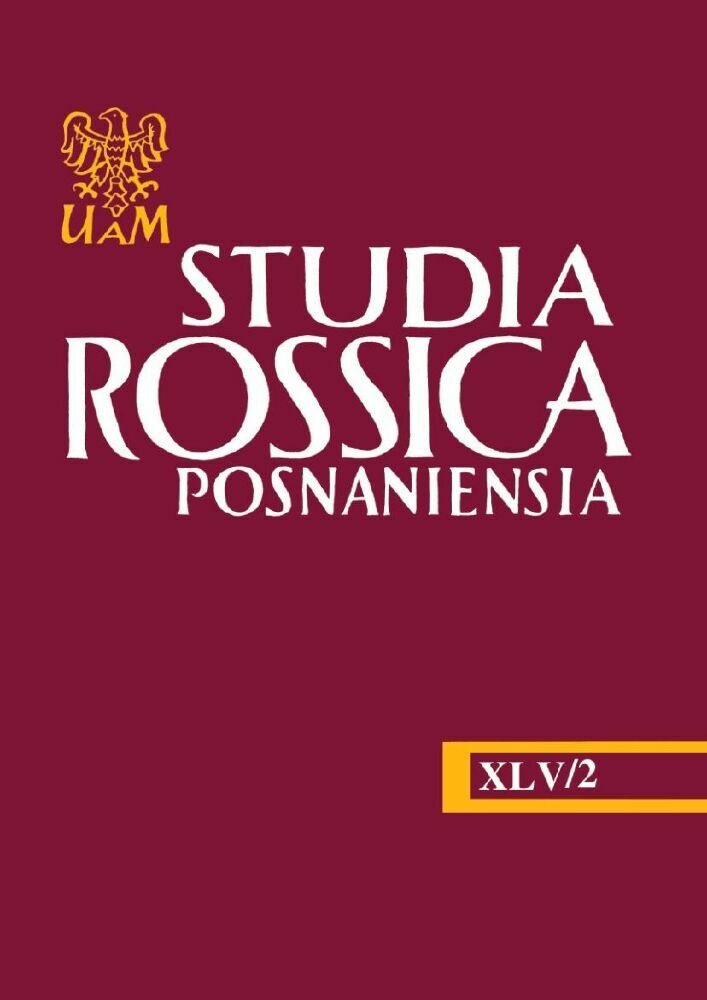Аннотация
The article analyses three dramas written by Oleg Bogayev (The Russian National Postal Service. A Room of Laughter for a Lonely Pensioner; Bashmachkin and Sansara). The purpose of the work was primarily to expose various forms, due to which we can talk about the grotesqueness of the subject, i.e. the relationship I – Others, the violation of the boundary between the categories of significant and signified, subject-object relations, the subject of the act of behaviour and the act of speech as well as the occurrence of the Voice as a separate unit from the subject. The author emphasises the fact that the contemporary figure of the subject has been reduced to the language level and experiences a crisis of self-identification, which in turn leads to the crisis of the drama itself. Comic characters balance between the real and the fantastic world. Their statements are often pictures-simulations, heavily saturated with irony, the grotesque and absurdity.
Библиографические ссылки
Baluch, Wojciech, Małgorzata Sugiera, Joanna Zając. Dyskurs, postać i płeć w dramacie. Kraków, Księgarnia Akademicka, 2002.
Baudrillard, Jean. Simulacres et Simulation. Paris, Éditions Galilée, 1981.
Bogaev, Oleg. Bašmačkin. Čudo šineli v odnom dejstvii. Web. 10.08.2019. http://bogaev.narod.ru/doc/bashmachkin.htm.
Bogaev, Oleg. Russkaâ narodnaâ počta. Komnata smeha dlâ odinokogo pensionera v odnom dejstvii. Web. 10.08.2019. http://bogaev.narod.ru/doc/post.htm.
Bogaev, Oleg. Sansara. Komediâ v odnom dejstvii. Web. 10.08.2019. http://bogaev.narod.ru/doc/sansara_2011.htm.
Delez, Žilʹ. Pâtʹ tezisov o psihoanalize. Web. 06.03.2019. https://syg.ma/@nikita-archipov/zhil-die-lioz-piat-tiezisov-o-psikhoanalizie.
Gončarova-Grabovskaâ, Svetlana. Poètika sovremennoj russkoj dramy (konec XX – načalo XXI v). Minsk, Belorusskij gosudarstvennyj universitet, 2003.
Kasperski, Edward. „Między poetyką i antropologią postaci. Szkic zagadnień”. Postać literacka: teoria i historia. Red. Edward Kasperski. Warszawa, Wydawnictwo Dydaktyczne Wydziału Polonistyki UW, 1998, s. 9–40.
Lagoda, Mariâ, Andrej Pavlov. „Grotesknyj subʺekt”. Poètika russkoj dramaturgii rubeža ХХ–ХХI vekov. Sbornik naučnyh statej. Red. Sergej P. Lavlinskij, Andrej M. Pavlov. Kemerovo, Stivès, 2011, s. 291–295.
Lavlinskij, Sergej, Viktoriâ Malkina, Andrej Pavlov. „Fantastičeskoe kak teoretiko-literaturnaâ i ès-tetičeskaâ kategoriâ. Diskursivno-vizual’nye aspekty”. Grotesknoe i fantastičeskoe v kulʹture: vizual’nye aspekty. Red. Viktoria Malkina. Ekaterinburg, Izdatel’skie rešeniâ, 2017, s. 25–69.
Mazurek, Halina. Dramaturdzy z Jekaterynburga. „Szkoła” Nikołaja Kolady. Katowice, Wydawnic-two Uniwersytetu Śląskiego, 2007.
Mięsowska, Lidia. Granie w postmodernizm. Dramaturgia rosyjska na przełomie XX i XXI wieku.Katowice, Oficyna Wydawnicza WW, 2007.
Mięsowska, Lidia. „Wmartwym świecie żywych przedmiotów. Obraz przestrzeni egzystencjalnej współczesnych Rosjan w twórczości Olega Bogajewa”. Antropologia kultury mieszczańskiej. Prace Interdyscyplinarne. T. IX. Red. Joanna Ławnikowska-Koper, Lucyna Rożek. Częstocho-wa, Wydawnictwo AJD, 2016, s. 181–192.
Ohman’ska, Beata.Tancuj do upadu, ešʹ, pej i razvlekajsâ! Harakteristika personažej pʹes Olʹ-gi Muhinoj. Web. 02.04.2019. http://rosyjskaruletka.edu.pl/2013/12/11/танцуй-до-упа-ду-ешь-пей-и-развлекайся-2/.
Petrova, Olga. Tipy ironii v hudožestvennom tekste: konceptualʹnaâ i kontekstualʹnaâ ironiâ. Izvestiâ Saratovskogo universiteta. T. 11, vyp. 3,Ser. Filologiâ. Žurnalistika, 2011. Web. 12.05.2020. https://cyberleninka.ru/article/n/tipy-ironii-v-hudozhestvennom-tekste-kontseptualnaya-i-kon-tekstualnaya-ironiya.
Pilat, Valenty. V orbite tvorčeskih vliânij Nikolaâ Kolâdy. Web. 02.12.2019. https://journals.kantia-na.ru/upload/iblock/0cf/%D0%9F%D0%B8%D0%BB%D0%B0%D1%82_387-396.pdf.
Sarrazac, Jean-Pierre. Słownik dramatu nowoczesnego i najnowszego. Przeł. Mateusz Borowski, Małgorzata Sugiera. Kraków, Księgarnia Akademicka, 2007.
Skatov, Nikolaj. Russkaâ literatura XX veka. Prozaiki, poèty, dramaturgi. T. 2. Moskva, Olma-Press Invest, 2006.
Žurčeva, Ol’ga. „Priroda konflikta v novejšej drame XXI veka”. Novejšaâ drama rubeža XX–XXI vv.: problema konflikta. Samara, Univers grupp, 2009, s. 18–27.
Лицензия
THE ARTICLES ARE PUBLISHED UNDER THE CREATIVE COMMONS LICENCE:
Attribution-NonCommercial-ShareAlike 4.0 International License.
Authors of texts accepted for publication in “Studia Rossica Posnaniensia” are required to complete, sign and return to the editor's office the Agreement for granting a royalty-free license to works with a commitment to grant a Creative Commons sub-license.
Under the agreement, the authors of texts published in “Studia Rossica Posnaniensia” grant the Adam Mickiewicz University in Poznań a non-exclusive, royalty-free license and authorize the use of Attribution-NonCommercial-ShareAlike 4.0 International (CC BY-NC-SA 4.0).
The authors retain the right to continue the free disposal of the work.
Internet users are entitled to use works published in “Studia Rossica Posnaniensia” since 2016, for non-commercial purposes only, under the following conditions: https://creativecommons.org/licenses/by-nc-sa/4.0/
Adam Mickiewicz University in Poznań retains the right to magazines as a whole (layout, graphic form, title, cover design, logo etc.).

